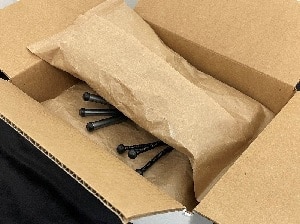Developing a dunnage bag system using heat-sealable paper
Developing a dunnage bag system using heat-sealable paper
In an age of online shopping and mass production, distribution centers are on the rise. Naturally, the amount of packaging is also increasing, and a practical solution is needed to close the loop of recycling so much waste. One major tool distribution company in the Midwest has found its own "circular economy" answer to this problem by using EcoShield Heat Sealable Paper to recycle used boxes into dunnage bags.

In an age of online shopping and mass production, distribution centers are on the rise. Naturally, the amount of packaging is also increasing, and a practical solution is needed to close the loop on recycling so much waste. One major tool distribution company in the Midwest has found its own "circular economy" answer to this problem by using EcoShield Heat Sealable Paper to recycle used boxes into dunnage bags.
Responsible, but resource-Intensive
With thousands of tools going in and out of the aforesaid distribution center, the facility was inundated with corrugated box waste. Already, the company had implemented a recycling initiative by bundling the boxes and sending them off to the recycling center. The downside of this process was the large quantity of resources consumed for baling, staging, pickup, and transport. Meanwhile, the company still had to buy a large amount of kraft paper for package cushioning and fill material in outbound shipments.
Reduce, reuse, recycle—onsite
A new idea to recycle the corrugated box waste into something valuable onsite was investigated. Special processing equipment from Europe along with a packaging machine from PAC Machinery's sister company, Audion, allowed the facility to chop up used cardboard boxes and automatically pack them inside paper bags made on an adjacent AVM vertical form, fill, and seal machine. These "dunnage bags" could then be placed inside shipping boxes for cushioning and void space fill.
Greg Berguig, VP of PAC Machinery said, "[I]t's a great story in terms of packaging and being able to reuse things for your outbound shipping—and the system pairs nicely with the Cortec® Heat Sealable Paper." This was the first U.S. install of the system—which was already in operation at several sites in Europe—and raised the question of how to ensure a reliable supply of heat sealable paper in a different region. Supply chain concerns were resolved with EcoShield® Heat Sealable Paper, which presented a reliable, recyclable alternative readily available from Cortec® Coated Products in Wisconsin.
Recyclable heat seal paper
EcoShield® Heat Sealable Paper is a versatile packaging material for a wide range of creative uses. Its heat sealable adhesive coating can be applied to many different types of paper—white or traditional brown recyclable kraft paper—to make a recyclable packaging material transformable into envelopes, bags, tags, or bands. The paper can be printed prior to heat sealing if special branding marks are required. In the case of the tool distribution center, a brown version of EcoShield® Heat Sealable Paper was selected for customer validation testing and was subsequently adopted for use on the Audion AVM vertical form, fill, and seal packaging machine.
Benefits of switching to heat seal dunnage bags
This changeover had dramatic benefits. In addition to eliminating the resources needed to collect and ship used boxes to the offsite recycling center, the customer is saving an expenditure of six figures previously used to buy packaging fill paper. In explaining the rationale for switching from offsite recycling to making dunnage bags onsite out of EcoShield® Heat Sealable Paper, Cortec's VP of Sales for Eastern North America, Mike Gabor, explained, "I think, one, it made a financial business sense for this company to do this. They saved a ton of money. Environmentally, they took that whole cycle out of the recycling stream and they did something good for everyone else, too. That's . . . the win-win of this thing."
Learning from each other
This ingenious solution is a great blueprint for any distribution center or facility that has a high volume of incoming and outgoing packages. By pairing the right equipment with EcoShield® Heat Sealable Paper and corrugated box waste, companies can promote the "circular economy" and close the recycling loop in house, just like this distribution center did.





